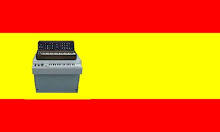 Año de publicación: Ninguna, nunca fue editado oficialmente. Grabado en 1979.
Año de publicación: Ninguna, nunca fue editado oficialmente. Grabado en 1979.Subgénero: Psicodelia, rock andaluz, hard rock.
Comentarios:
El título y la portada de este bootleg son invención mía, ya que se trata de una grabación nunca editada oficialmente.
Smash es un clásico del proto prog y la psicodelia españolas. Tras su disolución en 1972, Julio Matito (bajo y voz) editó un LP y un simple, y Gualberto (guitarra) hizo lo suyo con los clásicos "A La Vida, Al Dolor" y "Vericuetos". Una reunión de la banda se hizo posible en 1978, quizá propulsada por la explosión progresiva española de la segunda mitad de los 70, y al año siguiente hicieron una aparición en el mítico programa "Musical Express", conducido por Ángel Casas, en el cual presentaron tres temas nuevos: el instrumental "Otros Días" (no confundir con la suite que da nombre al tercer LP de Gualberto) (7:45), "Provocar" (3:49) y "Tiny Peter" (3:12). Los dos primeros muestran a unos Smash particularmente agresivos y cercanos al heavy metal, mientras que el tercero, mucho más apacible y con letra en inglés, se acerca al rock andaluz. Esta última es la única que se puede encontrar en internet, aunque con una calidad de sonido más que mejorable.
Lo que se ofrece en este post, son los tres temas en formato FLAC -copia clónica, sin pérdida, de la grabación original- y MP3 a 320 kbps. Se trata de un documento de inmenso valor, no disponible en internet, y puesto a vuestra disposición exclusivamente a través de Rock Progresivo Español gracias a la inestimable ayuda de José Ignacio... ¡gracias, tío!
Enlaces en comentarios.
ENGLISH:
Year of release: None, it's never been officially released. Recorded in 1979.
Sub-genre: Psych, andalusian rock (rock + flamingo), hard rock.
Comments:
The album title and cover of this bootleg were made up by myself, since it is a never officially released recording. "Canciones Perdidas" means "Lost Songs".
Smash is a classic of spanish proto prog and psychedelia. After their breakup in 1972, Julio Matito (bass and vocals) released one LP and one single, while Gualberto (guitar) released the classic albums "A La Vida, Al Dolor" and "Vericuetos". The band reformed in 1978, probably due to the progressive rock explosion in Spain in the second half of the 70's, and next year the band played live in the legendary Musical Express TV show hosted by Ángel Casas (for those in England, "Musical Express" was in Spain a bit like what that Granada TV program hosted by Tony Wilson was in the UK, bringing in new local bands and stuff). The band performed three new songs: the instrumental "Otros Días" (not to be confused with Gualberto's third album title track) (7:45), "Provocar" (3:49) and "Tiny Peter" (3:12). The first two show an unusually hard rock sounding, close to heavy metal, side of the band, while the third one is much more laid back and closer to andalusian rock (with lyrics in english) - it is the only song off this permormance available on internet, albeit with poor sound.
What is offered on this post are the three tracks in FLAC format as well as MP3 format at 320 kbps, ripped from the best possible source. It is a recording of enormous value, never available before on the internet, brought to you exclusively by Spanish Progressive Rock with the invaluable help of José Ignacio.
Links in comments.

























